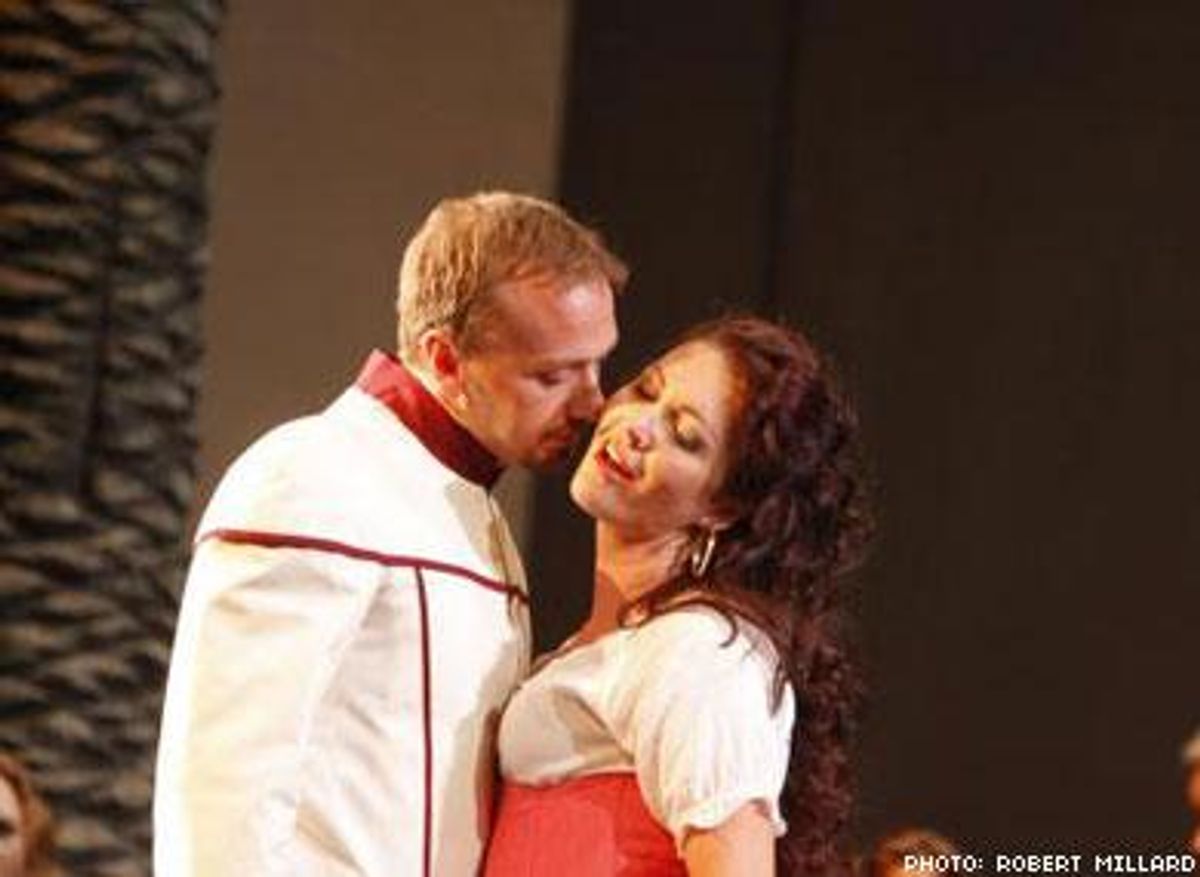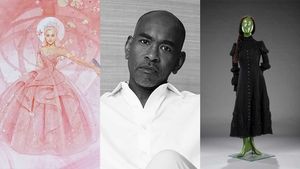It's not
very often that a lowly music critic gets the privilege of
witnessing a glowing performance by a major new talent at
the beginning of his or her career, but that is
certainly what happened to yours truly on the evening
of November 15 at the Los Angeles Opera. Viktoria Vizin,
an astounding new mezzo-soprano making her L.A. Opera debut
as Carmen this season, took my breath away. But
more of that anon.
Georges
Bizet's Carmen is one of the most
perfect operas in the repertoire -- a statement I think
few would dispute. It has a great plot, fully realized
characters, and a brilliant score full of hit tunes
that even the most avid opera hater could probably
whistle in his sleep.
It's also
an opera that's hard to sabotage; only the most inept
of performances could fail to please a public that
never grows tired of it. Fortunately, this
night's performance in Los Angeles was far from
inept; in fact, it was one of the most enthralling,
entertaining, and fully satisfying performances of
this opera that I have ever witnessed.
Perhaps we should
start at the top, and this brings us back to newcomer
Viktoria Vizin. Since the title character is the beating
heart of the work, the lead singer can either make or
break this opera's performance. In a word,
Vizin is astounding. A singer with an incredible range,
Vizin had everything going for her this evening: a
rich, creamy, virtually flawless mezzo voice; great
stage presence; astonishingly well-thought-out acting;
and palpable sex appeal. We're far from the days
of matronly Carmens here -- Vizin brought the character to
life, and it was easy to see why anyone -- male or
female -- would find her unbridled sexuality
irresistible. Vizin is definitely one to watch -- in my
opinion, probably one of the great opera stars of the coming
generation.
Richard Strauss
famously referred to himself as a "first-rate
second-rate composer," and many might refer to
tenor Marcus Haddock in the same way, only
substituting the word singer. Haddock is definitely
second-string, but he made a strong showing this evening,
growing in strength through each successive act. The
famous "Flower Song" was delivered
nicely, but Haddock really warmed to his task in the final
duet. Though no Domingo or Vickers (both famous portrayers
of Don Jose), Haddock made his character's
torment and rage very real, and his final
confrontation with Carmen was riveting.
Baritone Raymond
Aceto as the bullfighter Escamillo, the third point in
this famous love triangle, gave the second strongest
performance of the evening, definitely surpassing
Haddock in vocal prowess. Aceto's voice could
quite easily be described as golden. Rich and effortless, it
brought off the famous (or perhaps infamous)
"Toreador Song" with aplomb. Add to this
Aceto's smoldering sexiness (both physically and
vocally) and we had an Escamillo of one's
dreams.
Genia
Kuhmeier's Michaela was sung sweetly, but not
exceptionally. Granted, Michaela does not have the
depth or range of the title character, being pretty
much a one-note part, but Kuhmeier didn't add a
great deal of distinction to what was overall a first-rate
cast. However, she did sing her big third act aria
very nicely, but there was not much in her performance
that raised her above one's usual expectations of the
role.
Surprisingly, the
secondary characters were universally top-drawer, the
two main standouts being Kendall Gladen's Mercedes and
Daniel Montenegro's Dancairo. Gladen possesses a
tantalizing mezzo voice -- she may prove a formidable
Carmen herself in the future -- and
Montenegro's sweet tenor, swaggering stage presence,
and appealing good looks promise much success for him
in the coming years.
The production is
not a new one -- it's a revival from a few years back
-- but it's one honey of a staging that I think
begs for a permanent place in the L.A. Opera's
repertoire. Fortunately, producer Emilio Sagi has
eschewed neurotic modernism for a colorful traditional
approach that doesn't have its own ax to grind,
a problem found in so many modern
"conceptual" productions. But this is no
museum-piece Carmen; there are many innovations
in the staging that prove that "traditional"
need not translate as "dull." Of particular
interest was director Javier Ulacia's staging
of the final duet, which brooded with foreboding and
ended with a hesitant Don Jose being almost forced to stab
Carmen against his will, as if being compelled to do
so by fate. Real drama on the opera stage -- what a
concept!
Emmanuel
Villaume's conducting was idiomatic and energetic,
and the sets and costumes were uniformly dazzling,
many of them eliciting spontaneous applause from an
obviously delighted audience. Add to this a corps of
extremely attractive and talented flamenco dancers in the
second and fourth acts, and the result was a
performance that will live in this critic's
memory for some time to come.

















































































